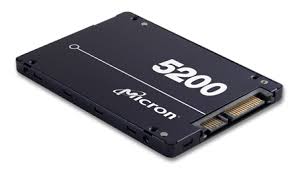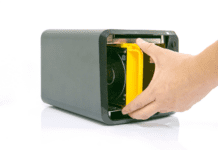See our full list of 7 Best and Fastest SSDs
Bottom Line:
Micron designed these SATA SSDs for virtualized workloads and cloud architectures. The read and write performance is short of others in this guide. Its random read performance and throughput are only slightly below that of the Samsung 883 SSD. However, the Micron 5200 Series wins out easily with regard to random write performance compared to the Samsung model.
The Micron also packs a decent throughput punch for SATA, delivers latency as low as 55 microseconds, and is one of the most reliable and durable SSDs around. Its low price point adds to its allure. And capacities of up to 7.68 TB ensure that it will always be a candidate for budget conscious organizations looking SSDs that can hold plenty of data and deliver it with adequate performance.
Product Description:
The new Micron 5200 series of SSDs empowers fast, consistent quality of service for virtualized workloads and cloud architectures. Built on Micron’s 64-layer 3D NAND, the Micron 5200 series delivers greater densities, throughput, consistency, and power efficiency. Leveraging the architecture of 5100 SATA SSDs, the Micron 5200 series is engineered to replace existing hard drives and legacy SSDs.
The Micron 5200 SSDs offer up to 99.7% better QoS compared to a Enterprise disk drives. Capacities range from 240 GB to 7.68 TB. Micron’s Flex Capacity feature enables adjustment of drive endurance, performance and capacity to meet changing storage needs.
The Micron 5200 Series SSD is also tough and durable. It can write up to 8.4 PB of data and can last up to 3 million hours before failure. The Micron 5200 SSD is an industry leader on mean time to failure and offers a very low annualized drive failure rate for SATA enterprise SSDs compared to other suppliers.
Features:
- Form Factor: 2.5 Inch SATA drive
- Capacity: 240 GB to 7.68 TB
- Random Reads: 95k
- Random Writes: 75k
- Throughput: 540 GB/s
- Endurance: 8.4 PB
- Lifespan: MTTF of 3 million device hours
- Data Protection: Enhanced power-loss data protection with data protection capacitor monitoring; AES 256-bit encryption, TCG Enterprise configurability
- Data Management: Storage Executive SSD management tool, Power loss protection for data in-flight, End-to-end enterprise data path protection
- NVMe: No
Key Markets and Use Cases:
Micron designed these SATA SSDs for virtualized workloads and cloud architectures. Use cases include:
- Big Data & Analytics
- Read-sentitive cloud services
- Content sharing applications.
- OLTP
- BI/DSS
- Media Streaming
- Hyperscale/Private Cloud
- Virtualized Environments
Workloads that require high endurance are also a good use case. The Micron 5200 Series SSD can write up to 8.4 PB of data and can last up to 3 million hours before failure.
For those looking to upgrade legacy storage arrays with SSDs, the Micron 5200 is engineered to deliver a fast, easy and cost-effective modernization path.
Hyperconverged and software-defined storage environments, too, can use these SATA SSDs to achieve server and storage platform consolidation.
Those with variable workloads and regularly changing needs can use these Micron SSDs as the user can adjust endurance, performance, and capacity levels as workloads and business needs evolve.
Warranty:
5 years
Pricing:
Starting at $300
Micron 5200
| Product | |
|---|---|
| Capacity | 240 GB to 7.68 TB |
| Random Reads | 95k |
| Random Writes | 75k |
| Throughput | 540 MB/s |
| Lifespan | up to 8.4 PB, 3 million hrs |
| Price | $300 |
| Category | Best SATA SSD |
| Key differentiator | High capacity |






